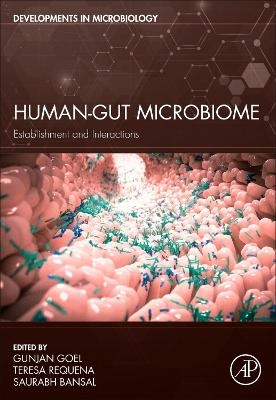
Human-Gut Microbiome
Academic Press Inc (Verlag)
978-0-323-91313-3 (ISBN)
This research is generating valuable insights into micro-ecological niches and their impact on humans, hence this new release covers these new insights. The book will be a valuable resource for scientists, researchers, postgraduate and graduate students who are interested in understanding the impact and importance of the omics approach to humans and their microbiomes.
Dr Gunjan Goel is an associate professor at the Department of Microbiology, Central University of Haryana, Mahendergarh, India. He completed his PhD in microbiology at the National Dairy Research Institute, Karnal, India, and did postdoctoral research at the University of Hohenheim, Germany and the University of Ghent, Belgium. He has been working in the area of microbial communities and their assessment and has published more than 70 research papers in journals of international repute. He has been the principal investigator for national and international research projects funded by government agencies. His current research focuses on deciphering the role of different factors affecting gut microbial ecology, bio-accessibility, and bioavailability of food ingredients for in vitro simulated gut-model systems, and the assessment of probiotics using in vitro and in vivo models. He is a life member of the Association of Microbiologists of India and the Probiotic Association of India and he is on the editorial board of Frontiers in Microbiology Dr Teresa Requena is scientific researcher on the, Spain. She specializes in lactic acid bacteria and modulation of intestinal microbiota by diet, probiotics, and prebiotics. Her recent research achievements relate to the development of in vitro dynamic models of simulation of the human intestinal microbial ecosystem. She has been an invited researcher at the University of Minnesota, USA, and the University of Otago, New Zealand and principal investigator for Spanish and international research projects. Dr Requena has collaborated with commercial companies through research contracts, having broad expertise in patent development and has transferred five patents to food and biotechnology companies. She is author of more than 120 scientific articles published in high-ranked scientific journals, two books, and over twenty book chapters. She is a member of the Board of Directors of the Spanish Society of Microbiota, Probiotics and Prebiotics Dr Saurabh Bansal works as an assistant professor in the Department of Biotechnology and Bioinformatics, Jaypee University of Information Technology, Waknaghat, India. He completed his PhD in biotechnology at the Department of Biochemical Engineering and Biotechnology, Indian Institute of Technology, Delhi, India. His PhD work involved the cloning, expression, purification, and characterization of the anti-cancer enzyme L-asparaginase from Pyrococcus furiosus, followed by development of their mutants, with improved turnover and catalytic efficiency, using a site-directed mutagenesis approach. Dr Saurabh has a keen interest in the identification of novel enzymes and improving their properties, using protein engineering tools, bio-catalysis, waste management, production optimization using bioprocess technology, and characterization. He has one US Patent. His work has been published in various internationally reputed journals namely, FASEB, Chemico-biological Interactions, Biochimica et Biophysica Acta - Proteins and Proteomics, Acta Crystallographica Section D: Biological Crystallography, and Journal of Molecular Liquids. He is a life member of the Biotech Research Society, India and the Society of Biological Chemists, India
Section A: Human Microbiome: Establishment and Functions
1. Early colonization of human microbiome
2. Techniques used in analysis of human microbiome
3. Challenges in studies related to human microbiome
4. Dietary influence on human microbiome
5. Effects of contaminants (heavy metals) on microbiota
Section B: Gut Microbiome in Health and Diseases
6. Role of gut microbiome in obesity
7. Relationship between gut microbiome and diabetes, human microbiome and neurological disorders
8. Human microbiome and neurological disorders
9. Importance of gut microbiome in diarrheal diseases
10. Human microbiome’s role in bone health
11. Gut microbiome and food allergy
12. Altered gut microbiome as a prodromal signature of Parkinson’s disease
13. Impact of indigenous microbiota in gut inflammatory disorders
14. Emergence of antibiotic resistance in gut microbiome and its effect on human health
15. Linkage of gut microbiome with hypertension
16. Gut microbiome in Chronic Kidney Diseases
| Erscheinungsdatum | 22.07.2022 |
|---|---|
| Reihe/Serie | Developments in Microbiology |
| Zusatzinfo | 30 illustrations (20 in full color); Illustrations |
| Verlagsort | Oxford |
| Sprache | englisch |
| Maße | 191 x 235 mm |
| Gewicht | 660 g |
| Themenwelt | Naturwissenschaften ► Biologie ► Mikrobiologie / Immunologie |
| ISBN-10 | 0-323-91313-X / 032391313X |
| ISBN-13 | 978-0-323-91313-3 / 9780323913133 |
| Zustand | Neuware |
| Haben Sie eine Frage zum Produkt? |
aus dem Bereich


